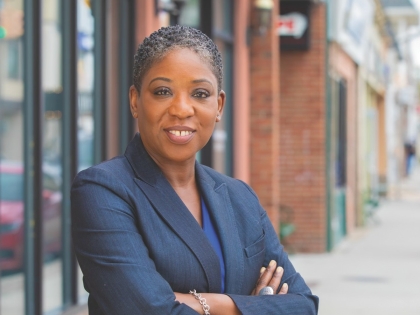
Siela Bynoe: No one with a disability should get left at the curb
June 27, 2025
-
ISSUE:
- Disabilities
As a state senator representing parts of Nassau County, I have found that my favorite part of the job is constituent affairs. I look forward to engaging with residents to learn firsthand about the urgent issues they are dealing with and to connect them with available resources. Twice during my first legislative session, residents reached out about situations in which the state lacked resources to meet their needs. In response, I was able to write legislation to mitigate their circumstances.
In one case, I sat down with the Long Island Center for Independent Living to discuss the barriers that people with disabilities face — specifically the severe lack of wheelchair-accessible taxis outside New York City. For the many thousands of New Yorkers who rely on wheelchairs, something as basic as calling a cab is frustrating and can even be downright dangerous, if not impossible.
In response, I proudly introduced and passed legislation through the Senate to help ensure that our wheelchair-accessible vehicle — or WAV — infrastructure meets the needs of every passenger. The bill, S7611A, would take the essential first step of creating a statewide definition of what constitutes a WAV, including safety features and requirements such as the measurements and load-bearing capacity of the vehicle’s lift or ramp.
The legislation would further require the state Department of Transportation to assess the availability of WAVs across the state and bring counties to the table to formulate plans to right this wrong. In addition, the bill would examine the creation of a grant program or tax incentives to help taxi fleet owners and drivers with the cost of purchasing or modifying their vehicles to meet the newly established requirements for wheelchair accessibility. The DOT study would shed light on how many people outside New York City are reliant on wheelchairs, and the number of accessible vehicles currently in use. This information would allow stakeholders to address shortfalls with greater precision.
The Americans with Disabilities Act has been in effect for more than 30 years, and has fundamentally reshaped American society to be more inclusive, paving the way for a 2014 settlement case requiring New York City to make at least half of its 13,000 yellow cabs, and all new cabs entering the fleet, wheelchair-accessible. While that was an important step forward, there are still gaps that we must address statewide. A 2019 report found that wheelchair accessibility was the most common concern among state residents when it came to ridesharing network accessibility.
Every day when wheelchair users request a ride, they’re met with inaccessible vehicles, untrained drivers or simply no options at all. Many live with the constant anxiety of not knowing whether they’ll be able to get home, facing the very real possibility of being stranded for hours, sometimes late into the night, in unfamiliar or unsafe places. In desperation, some are left with no choice but to call an ambulance just to get home — a costly, inappropriate option that further strains our already overburdened emergency medical services. This bill would work to address this desperation and help bring Long Island into the modern era.
This problem goes far beyond a simple inconvenience. It is a systemic failing that limits our neighbors’ access to jobs, medical care, social connection and civic participation. When wheelchair users can’t count on basic mobility, many of their rights are functionally denied.
The solution doesn’t have to be complicated. The vehicles are attainable. The technology exists. What’s lacking is the investment of effort and funding and the political will to meet the urgency of this matter in order to achieve greater equity. We must prioritize looking after one another, especially our most vulnerable, because that should be the core of who we are.
My job is to be a voice for our community, and to act when there is a threat to the dignity and safety of those I represent. I’m proud to have had unanimous support in the Senate to advance legislation that would help tackle these inequities, and look forward to making further progress next session in this crucial fight for inclusion.
Let’s make it clear that in New York, no one gets left at the curb.
First published in LI Herald, 6/26/25 edition.
related legislation
Share this Article or Press Release
Newsroom
Go to NewsroomSiela Bynoe: Fighting for those who fought for us
October 28, 2025
Siela Bynoe: Affordability can’t just be a talking point
September 17, 2025
